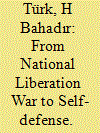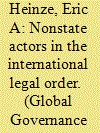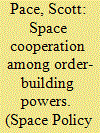| Srl | Item |
| 1 |
ID:
175139


|
|
|
|
|
| Summary/Abstract |
The leader of the Kurdistan Workers’ Party (Partiya Karkerên Kurdistan or PKK), Abdullah Öcalan, has played a crucial role in shaping the road map of the PKK since the founding of the organization in 1978. His ideas have substantially influenced the structure of the PKK. This article analyzes whether Abdullah Öcalan’s perspective on violence changed over the period between the founding of the PKK and the present. Using an interpretive–textual method, the study examines Öcalan’s approach to the question of violence before and after his imprisonment on the island of İmralı in 1999. The study attempts to make sense of how his perspective on violence was constructed and developed during these two periods. To achieve this goal, the study demonstrates the differences and similarities in Öcalan’s approach to the concept of violence during these two periods. Accordingly, it is argued that Öcalan’s perspective on violence is marked by continuity rather than a rupture.
|
|
|
|
|
|
|
|
|
|
|
|
|
|
|
|
| 2 |
ID:
098764


|
|
|
|
|
| Publication |
2010.
|
| Summary/Abstract |
Modern warfare and the war on terror against mainly non-State actors have obliged States to resort to innovative measures which blur the limits between jus in bello and jus ad bellum and create a legal oxymoron where the same measures constitute international law violations should they be perceived under jus in bello and legitimate means of self-defense should they be seen under the lens of self-defense and jus ad bellum. In order to demonstrate the particular axiom the note will use the Israeli-Palestinian conflict as a factual and normative framework and will put under its kaleidoscope the post-disengagement Israeli measures towards Gaza.
|
|
|
|
|
|
|
|
|
|
|
|
|
|
|
|
| 3 |
ID:
187404


|
|
|
|
|
| Summary/Abstract |
The Strait of Hormuz has great significance for the world economy as an oil chokepoint. Yet in recent years, international navigation through the Strait of Hormuz has been repeatedly hampered and subject to discriminatory navigational restrictions and attacks. Such measures have been mostly aimed at oil tankers. This article examines the maritime incidents that occurred in the Strait of Hormuz in 2019: mine attacks against oil tankers and the arrest of an oil tanker by the Iranian armed forces. This study approaches these incidents from the perspectives of the law of the sea and from jus ad bellum.
|
|
|
|
|
|
|
|
|
|
|
|
|
|
|
|
| 4 |
ID:
086434


|
|
|
|
|
| Publication |
2009.
|
| Summary/Abstract |
The concern of whether nonstate actors can undertake an "armed attack" that would trigger a state's right to self-defense has acquired new prominence in the post-September 11 world. This article addresses that concern by examining the Israeli-Hezbollah conflict of July 2006. It argues that since the US invasion of Afghanistan in 2001, states have incurred an increased responsibility for the acts of nonstate actors that operate from their territory. Based on this emerging norm, the argument is that the degree of Lebanon's involvement in Hezbollah's attack against Israel was sufficient to justify the use of force in self-defense by Israel against both Hezbollah and the state of Lebanon. The conclusion is that while this is a potentially dangerous development in international law, there is reason to suggest that it may actually encourage states to prevent their territory from being used by nonstate actors to export violence.
|
|
|
|
|
|
|
|
|
|
|
|
|
|
|
|
| 5 |
ID:
147524


|
|
|
|
|
| Summary/Abstract |
The global community is threatened by several kinds of disorder, including regional instabilities on land and the high seas (e.g., Ukraine, South China Sea). In addition, developing Russian and Chinese counterspace capabilities are creating new tensions in space. This article discusses similarities and differences between the maritime and space domains, governance, and how international cooperation in these domains could contribute to international stability. Current difficult questions related to the exercise of the right of self-defense in space are addressed with suggestions for future research. In light of the increasing importance and globalization of space activities, new norms of behavior in space need to be developed by like-minded national to create a more stable and secure international order.
|
|
|
|
|
|
|
|
|
|
|
|
|
|
|
|